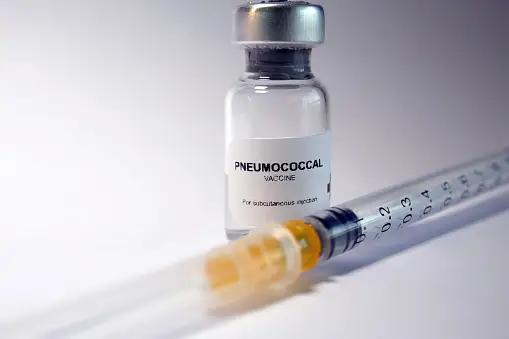Pneumococcal vaccine – administration of antigenic material (vaccine) to stimulate an individual’s immune system to develop adaptive immunity to a pathogen.
Image credits: Unsplash

Researchers in Denmark aimed to assess the vaccine effectiveness (VE) of the 23-valent pneumococcal polysaccharide vaccine (PPSV23) against invasive pneumococcal disease (IPD) in individuals aged 65 and older. The study’s findings indicate that PPSV23 vaccination protects IPD across most serotypes or serotype groupings, except for serotype 3. These results emphasize the ongoing need for research and potentially targeted vaccination approaches to mitigate specific serotype vulnerabilities among older populations.
The analysis unveiled a vaccine effectiveness of 32% for PPSV23 against all-type IPD and 41% against PPSV23-serotype IPD. These results, stemming from a study with enhanced statistical power compared to previous research, offer compelling evidence of PPSV23’s protective efficacy in the specified age group. Furthermore, they enhance our understanding of PPSV23’s effectiveness across different serotype groupings of IPD.
“Compared with our previous study on PPSV23 in Denmark, this follow-up study finds a lower VE against all-type IPD (42% vs. 32%) and PPSV23-vaccine type IPD (58% vs. 41%). This study covers the entire vaccination program and includes persons offered PPSV23 at the beginning of the program; that is, more vulnerable groups where the vaccine might not have the same effect. In this study, persons who received a vaccination were censored for 14 days after vaccination.”1
3 Key Takeaways
- The study highlights the effectiveness of the 23-valent PPSV23 against IPD in individuals aged 65 and older, with notable protection observed against most serotypes or serotype groupings, except for serotype 3.
- Analysis reveals a VE of 32% against all-type IPD and 41% against PPSV23-serotype IPD, providing robust evidence of PPSV23’s efficacy in this age group, with enhanced statistical power compared to prior research contributing to a deeper understanding of its protective benefits.
- The study underscores the importance of ongoing research and potentially targeted vaccination strategies to address specific vulnerabilities among older populations.
The researchers employed a Cox regression model to assess vaccine effectiveness, adjusting for crucial demographic factors like age, sex, and underlying health conditions. Utilizing nationwide data, they scrutinized the vaccine effectiveness of PPSV23 against both all-type IPD and PPSV23-serotype IPD. Furthermore, they broadened their analysis to estimate vaccine effectiveness against IPD caused by specific serotypes, excluding certain variations to achieve a more nuanced understanding.
The investigators explain,” Our study shows that PPSV23 is effective against serotypes 8 and 22F and that a vaccination program might be an important factor in protecting persons >65 years of age against IPD caused by those serotypes.”1
One limitation of this study is the scarcity of events in certain analyses, resulting in diminished statistical power and wider 95% confidence intervals, particularly notable for the PPSV23 non-PCV20 estimate. Additionally, the study lacked adequate follow-up time beyond 3 years to assess potential waning effects, although minor declines were observed. These limitations necessitate future follow-up studies to evaluate the long-term durability of protection. Another concern is the potential for healthy vaccine bias, despite similar age distributions and comorbidity profiles between vaccinated and unvaccinated groups. However, the increasing difference in influenza vaccination coverage over the study period might lead to an overestimation of PPSV23’s effectiveness due to the protective effect of influenza vaccination against IPD.
In conclusion, this study highlights that PPSV23 vaccination effectively protects individuals aged over 65 against various forms of invasive pneumococcal disease, encompassing all-type IPD and specific serotype-related IPD, such as those linked to serotypes 8 and 22F, and PPSV23 non-PCV15/PCV20 serotypes. Nonetheless, it does not confer protection against IPD associated with serotype 3. Additionally, the vaccine’s effectiveness has remained largely consistent over nearly 3 years, advocating for the continued implementation of PPSV23 vaccination programs for individuals in this age group.
Future VE against IPD
Anticipating the FDA’s Priority Review decision on June 17, 2024, for V116, an Investigational Adult Specific Pneumococcal Conjugate Vaccine, designed for the prevention of IPD and pneumonia in adults aged 18 years and older, significant insights into its efficacy and safety have emerged.
In this population, whether they are vaccine-naive or experienced, with or without risk conditions, V116 has shown promising results. It stimulates robust immune responses against all 21 serotypes encompassed in the vaccine formulation. Moreover, compared to PCV20, it demonstrates noninferiority across common serotypes and superiority for 10 out of 11 unique serotypes, especially in individuals aged 50 years and above who have not received pneumococcal vaccination. V116 maintains its immunogenicity in individuals with prior pneumococcal vaccine exposure, regardless of the previous vaccine received. When administered concurrently with inactivated influenza vaccine, V116 retains its immunogenicity.
References
-
Nielsen, K., Nielsen, L., Dalby, T., Lomholt, F., Slotved, H., Fuursted, K….Valentiner-Branth, P. (2024). Follow-Up Study of Effectiveness of 23-Valent Pneumococcal Polysaccharide Vaccine Against All-Type and Serotype-Specific Invasive Pneumococcal Disease, Denmark. Emerging Infectious Diseases. 30(6), 1164-1172. Accessed May 30, 2024. Doi: https://doi.org/10.3201/eid3006.230975
-
CDC. V116: An Investigational Adult Specific Pneumococcal Conjugate Vaccine. MERICK. ACIP Meeting, 29-Feb-2024. Accessed May 30, 2024. chrome-extension //efaidnbmnnnibpcajpcglclefindmkaj/https://www.cdc.gov/vaccines/acip/meetings/downloads/slides-2024-02-28-29/04-Pneumococcal-Platt-508.pdf








